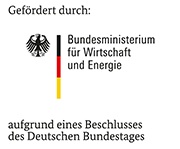IGF20445N/1

| Period: | 14.01.2019 – 30.06.2021 |
|---|---|
| Partner: | DWI – Leibniz-Institut für Interaktive Materialien |
| Funder: |
Arbeitsgemeinschaft industrieller Forschungsvereinigungen (AiF) |
| Project Manager: | Robin Kupec |
| Division: | Chemical Technology |
| Team: | Applied Electrochemistry |
Motivation
Bioaccumulation of persistent organic pollutants (POPs) is of great concern due to their potentially harmful effects in humans and the environment. The term POPs comprises a variety of chemicals particularly halogenated organics e.g. perfluorinated tensides (PFT), x-ray contrast agents, pesticides and disinfectants, all of which are resistant to photolytic, chemical and biological degradation. Thus removal by conventional wastewater treatment plants is impossible.
Summary
The goal of the project „ElektroDeHalo“ is the development of an electrochemical process for degradation of persistent organic pollutants in wastewater. In cooperation with the DWI their recently developed microtubular gas diffusion electrodes, made out of carbon nanotubes (CNT), will be combined with boron doped diamond electrodes (BDD). The microtubes are highly capable to adsorb pollutants due to their high surface area. Subsequently the pollutants are electrochemically desorbed and degraded which leads to the regeneration of the adsorber. To achieve high efficiencies for the degradation process, oxidizing agents are produced at the anode and cathode simultaneously.
back

Das IGF-Vorhaben Nr. IGF20445N/1 der Forschungsvereinigung DECHEMA e.V., Theodor-Heuss-Allee 25, 60486 Frankfurt am Main wurde über die AiF im Rahmen des Programms zur Förderung der industriellen Gemeinschaftsforschung (IGF) vom Bundesministerium für Wirtschaft und Energie aufgrund eines Beschlusses des Deutschen Bundestages gefördert.